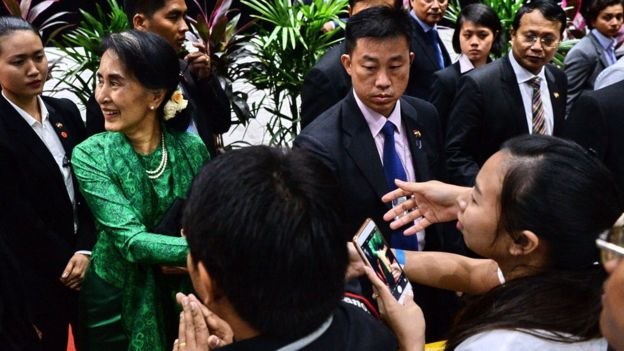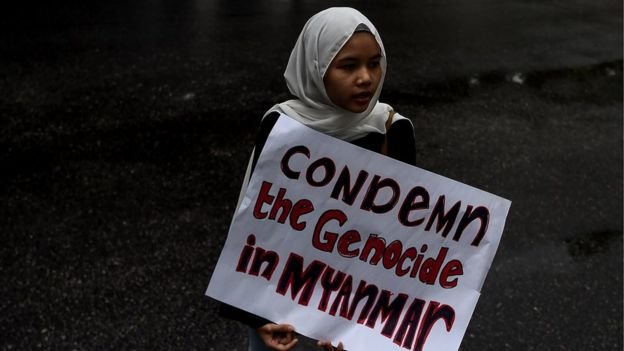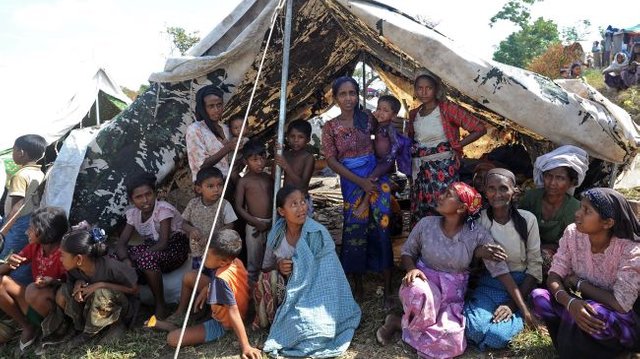⚠️⚠️⚠️Rejected by the country they call home and unwanted by its neighbours, the Rohingya are impoverished, virtually stateless and have been fleeing Myanmar in droves and for decades.
In recent months, tens of thousands of Rohingya have fled to Bangladesh amid a military crackdown on insurgents in Myanmar's western Rakhine state.
They have told horrifying stories of rapes, killings and house burnings, which the government of Myanmar - formerly Burma - has claimed are "false" and "distorted".
Activists have condemned the lack of a firm international response. Some have described the situation as South East Asia's Srebrenica, referring to the July 1995 massacre of more than 8,000 Bosnian Muslims who were meant to be under UN protection - a dark stain on Europe's human rights record.
What's happening?
Tun Khin, from the Burmese Rohingya Organisation UK, says Rohingyas are suffering "mass atrocities" perpetrated by security forces in the northern part of Rakhine state.
A counter-insurgency campaign was launched after nine border policemen near Maungdaw were killed in a militant attack in early October, but the Rohingya say they are being targeted indiscriminately.
The BBC cannot visit the locked-down area to verify the claims and the Myanmar government has vociferously denied alleged abuses.
But UN officials have told the BBC that the Rohingya are being collectively punished for militant attacks, with the ultimate goal being ethnic cleansing.
What led to the current situation?
The Rohingya are one of Myanmar's many ethnic minorities and say they are descendants of Arab traders and other groups who have been in the region for generations.
But Myanmar's government denies them citizenship and sees them as illegal immigrants from Bangladesh - a common attitude among many Burmese.
The predominantly Buddhist country has a long history of communal mistrust, which was allowed to simmer, and was at times exploited, under decades of military rule.
About one million Muslim Rohingya are estimated to live in western Rakhine state, where they are a sizable minority. An outbreak of communal violence there in 2012 saw more than 100,000 people displaced, and tens of thousands of Rohingya remain in decrepit camps where travel is restricted.
Hundreds of thousands of undocumented Rohingya already live in Bangladesh, having fled there over many decades.
UN: Myanmar wants ethnic cleansing.

But others say international media fail to understand the complex situation in Rakhine state, where Rohingya Muslims live alongside the mostly Buddhist Rakhine people, who are the state's dominant ethnic group.
Khin Mar Mar Kyi, a Myanmar researcher at Oxford University, told the South China Morning Post that the Rakhine were the "most marginalised minority" in Myanmar but were ignored by Western media, which she said displayed a "one-sided humanitarian passion".
Other researchers like Ronan Lee of Australia's Deakin University disagree with this argument, noting that while the Rakhine also face deprivation, "the solution when faced with massive rights violations is not to announce that someone else is worse off".
In her recent media comments, Ms Suu Kyi said Rakhine Buddhists "are worried about the fact that they are shrinking as a Rakhine population percentage-wise" and said she wanted to improve relations between the two communities.
A special Myanmar government committee appointed to investigate the ongoing violence in Rakhine state said in an interim report in early January that it had so far found no evidence to support claims of genocide against the Rohingya, nor to back up widespread rape allegations.
The report made no mention of claims that security forces had been killing civilians. Observers had, in any case, not had high hopes of a credible or independent investigation from the committee, which is headed by former general and current Vice-President Myint Swe.

Leading regional newspapers have condemned Asean's inaction, with Thailand's The Nation describing it as an "accessory to murder and mayhem".
A meeting of Asean foreign ministers to discuss the crisis was held on 19 December in Myanmar's capital, Yangon, but was dismissed as "largely an act of political theatre" by the Asean Parliamentarians for Human Rights grouping.
Indonesia's ambassador to London, Rizal Sukma, told the BBC in December that a comprehensive approach was needed.
He said an investigation with regional participation should be launched and that his country stood ready to participate if any such commission was to be formed.

But some have questioned how useful this commission will be, given the exhaustive number of reports that already exist. Its report, in any case, will not be released until later this year.
Reporting by Kevin Ponniah.
Courtesy : BBC
http://www.bbc.com/news/world-asia-38168917

Nice article, should it be that the world is turning a blind eye on this genocide?
Downvoting a post can decrease pending rewards and make it less visible. Common reasons:
Submit
thank you for your valuable comment.
Downvoting a post can decrease pending rewards and make it less visible. Common reasons:
Submit
Hi! I am a robot. I just upvoted you! I found similar content that readers might be interested in:
http://www.bbc.com/news/world-asia-38168917
Downvoting a post can decrease pending rewards and make it less visible. Common reasons:
Submit
I voted for you and followed you, you will vote and follow me
Downvoting a post can decrease pending rewards and make it less visible. Common reasons:
Submit
thanks brothe. Ive also followed you.
Downvoting a post can decrease pending rewards and make it less visible. Common reasons:
Submit
Please follow me
Downvoting a post can decrease pending rewards and make it less visible. Common reasons:
Submit